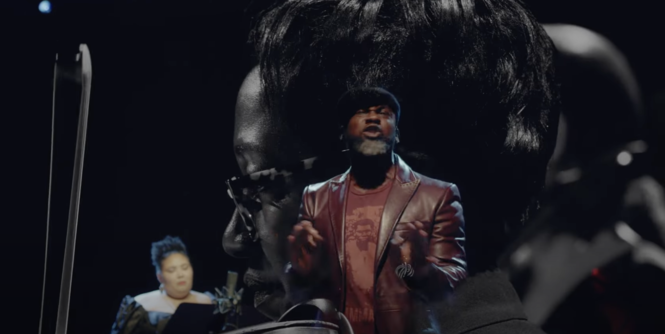Future Now
The IFTF Blog
Deploying Artists as Futurists and Policy Makers
“What if we treated the art of cultivating dignity as an intentional economy? What if dignity was currency and the raw material to make it was culture? Why aren’t our systems more artful? If you had equity stakes in empathy, who would you invest in first?” These are some of questions put forth by Marc Bamuthi Joseph, Vice President & Artistic Director of Social Impact at The Kennedy Center for Performing Arts, during an IFTF Foresight Talks webinar (watch it here) on January 24, 2022, with Hodari Davis, longtime IFTF Affiliate and Chief Innovation Officer at Edutainment for Equity. During the conversation, they examined the future of cultural equity through the lens of the arts and shed light on the pedagogy of cultural futuring. The main point Joseph drives home is that we need more creativity in our institutions and systems, which should mimic the way in which art is created.
The whole Foresight Talks webinar with Joseph and Davis is well worth a listen, but here are a few highlights from the talk:
Joseph argues that artists should be our future policy makers, because artists are futurists, who can be empowered to shape our technological and economic systems. In order to reach this level of sophistication in our economic development, it is important to establish a paradigm and relationship between art, economy, technology, and the future. The vast amount of design work that goes into making art can be a model for the way the economy and/or healthcare policy are created. In Joseph’s words:
"The qualities, the exercises, the characteristics that it takes to make art, which are not divisive, which tend not to be hierarchical…can we take the same elements that it takes to make a play to also craft an economy or to craft a health care system? Where is the artistic or design thinking inside of board structures, inside of leadership structures of these organizations that set the course for aspects of the social matrix?”
Through art, there exists a window into the idea of “adjacent possible” (Stuart Kauffman’s theory that systems transform into more complex systems by taking small, incremental steps). Joseph uses this theory to support his argument that art can provide a symbolic moment that brings individuals of different cultural backgrounds closer together, and serve as a powerful incubator for empathic experiences. However, there is no dance or a poem that can eliminate violent acts of heterosexism or white supremacy, so we can’t “let our social pathologies off the hook.” Our social systems of power and policy should be more artlike, more inclusive, and more collaborative.

Marc Bamuthi Joseph performs alongside other musicians as part of The Cartography Project. (Image by The Kennedy Center)
Joseph helps lead The Cartography Project, which is a commissioned project of the National Symphony Orchestra and the Washington National Opera that maps Black dignity. They began this undertaking by identifying places where there have been iconic transgressions against Black dignity and finding young composers or librettists who are inspired to create artwork as a cultural response. It seeks to use music as a source of healing, a way to open dialogue and ask questions about the future of anti-racism, and a way to generate revenue (economic equity) for those who have been affected by racial injustice. (You can watch a docuseries about the project here.) The project commissioned young Black artists to create and record works of music, which on April 4th, they auctioned off as non-fungible tokens (NFTs). The funds from the NFT auction were split between all the artists of each piece and the families affected by racial violence. This project is a demonstration of Joseph’s key points: You can’t perform or act without practice. Institutions can’t merely perform equity and allyship without first putting it into practice, just how foresight and anything else is first practiced. Providing financial resources for Black dignity (i.e. to Black communities and families) is a way of practicing equity. Let’s go beyond pageantry and take concrete fundamental steps.
One of Joseph’s goals is not to be anti-racist, but rather to be counter-capitalist with the ambition to elevate a wide-spread practice of systemic allyship. He says, “we can prepare for the future by crafting an institutional emotional readiness that prepares us to have broad pedagogical conversations about programmatic outcomes recognizing who has the most stakes in the future that we want.”
Inspiration is a constitutional right for all. You can’t be enfranchised without inspiration, and that is the role of the cultural sector. The arts are the most direct tool for enfranchisement, and should be supported and formalized as such, in federal policy.
Developing new language can be a productive method for a group to design its future. We often get stuck debating current, sometimes stale, language about what we think we already know rather than debating future action and strategy. Instead, we can shape the future forward together through collaborative neologism. In other words, let’s unstick ourselves from the past by co-creating new words as an artful process to redefine our futures.



